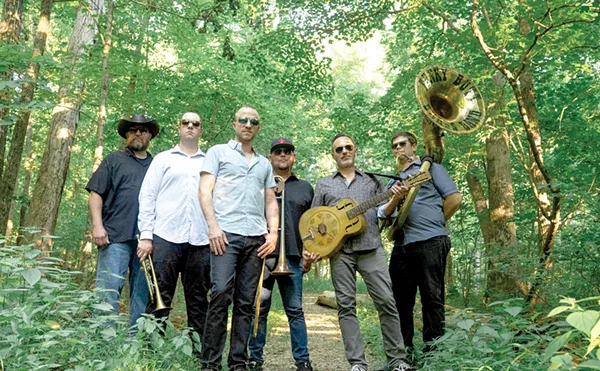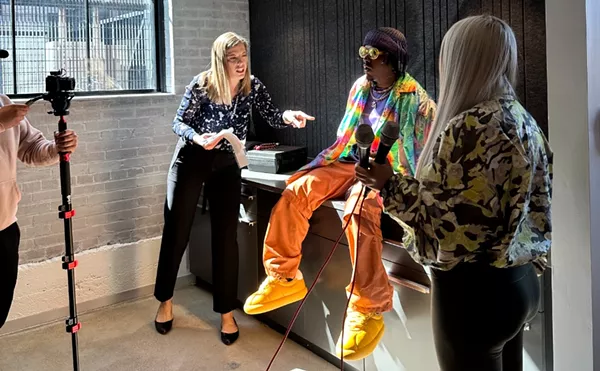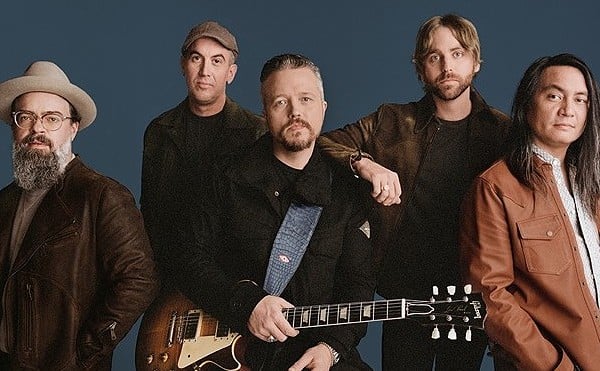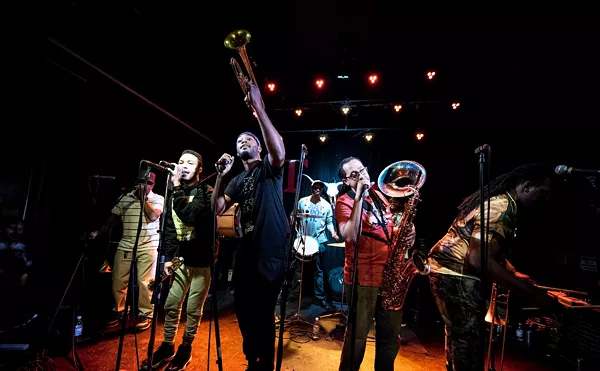St. Louis' Syrhea Conaway didn't start her solo project, Syna So Pro, with a cappella performance in mind. For years she has employed a multi-instrumentalist's approach to her work, relying on a pair of pedalboards containing a multitude of effects and looping pedals to flesh out her sound in a live setting.
But technical difficulties at a fateful out-of-town show made instrument-free performance a necessity — and helped Conaway find her voice in a whole new way.
Conaway was performing a solo gig in a Chicago bar when her gear malfunctioned, causing a brief moment of panic for the artist. But instead of stopping the show, she just started singing, her vocals alone filling the space.
In the audience that night was Matt Pakulski of FPE (For Practically Everyone) Records, who was impressed by Conaway's exploration. He bought her album and played it for his young daughter, whom he consults before signing any artists. When she liked what she heard, Pakulski approached Conaway, offering to put out her next record.
VOX, to be released December 9, is the solo a cappella album born of this union. Conaway is already a well-known figure in St. Louis' music scene, performing for nine years as part of various groups including Whoa Thunder and Pat Sajak Assassins. VOX is the third of her solo efforts, which generally serve as a departure from her work with other artists.
"Syna So Pro started because I wrote these songs for bands, and they didn't think they were actual songs," Conaway says. "But I was trying to convince people that these were songs. So I started this recording project, never thinking it would be a live thing."
VOX begins with a brief opening that creates a circle with the last track (listen to the record on repeat to hear it) before launching into "Kickman." The song starts out in tUnE-yArDs terrain with fluctuating vocal melodies and harmonies, then turns to a more traditionally driving beat with inspirational lyrics, ending with a fierce snarl.
In terms of influence, Conaway cites choral arrangements and any band with lots of vocal harmony, especially Queen. But she's hesitant to allow her sound to be limited to any genre, wary of letting people judge her music before even listening to her.
"Once you say 'choral,' people get a certain idea about what they think the music will be, and it doesn't have to be that way," says Conaway. "I'm trying to break down these silly constructs that we've built and come to believe, by changing things slightly or making it yours. It doesn't have to be one-sized."
One of the greatest influences present in VOX is Conaway's childhood, or at least her journey into adulthood. Halfway through the album, "On the Radio" takes a sharp turn to spoken-word territory. She revisits a pre-teen memory of performing a song for her father, a song that then materializes in the next track, "Petey the Turtle."
The song is a true story — Conaway explains that she wrote most of the songs on VOX in her teenage, amateur musician years. "Most of it was written [back then], and I revisited it," she says. "I listened to it and thought, 'Wow, the shit I wrote back then is so much better than what I'm writing now.' Sometimes playing in a band can make you kind of lazy."
The album includes both hymnal, almost carol-like vocals on "Make a Move" and a smooth rap in "Holiday."
"Genre really bothers me," she says. "We as a society have been trained to put everything in a box, including people. I can never really truly articulate anything that I've created and put it in a box, because I've always been influenced by everything I've ever experienced."
That attitude carries over to Conaway's life outside of music as well. Both before and after this year's tumultuous presidential election, she observes, people have been quick to make judgments about others — some founded, some not. Through her album, she wants to resist this drive.
"With the political climate, with Trump winning, it's really sad to see so many people very sad, very angry and upset," she says. "But at the same time, you're still part of the problem of labeling a person or people who voted for a candidate as a certain thing."
Instead of judgment, Conaway's songs reflect a positive message, with lyrics that repeat inspirational sentiments like "you are down; you need to rise up" throughout.
"I just want people to think for themselves, because there's just so much non-objective thinking going on right now, a lot of repeating what we've heard, not really analyzing what's really going on or asking, 'Am I part of the problem, or do I really have a solution?'"
VOX's eclecticism, its inability to stay in one genre or conform to one set of expectations, resists easy definition. The same could be said about the more complex socio-political issues of our time. Through her work as Syna So Pro, Conaway hopes she is breaking down molds.
"What I'm trying to do," she says, "is plant a seed for people to see that what they think they know is kind of an illusion, that what they hold is not necessarily true, not really accurate."
Another refrain in the album, the lyrics that literally tie together it together, goes: "Everyone has a voice, you gotta learn how to use it."
Syrhea Conaway has found her voice in VOX — and she wants you to find yours as well.






